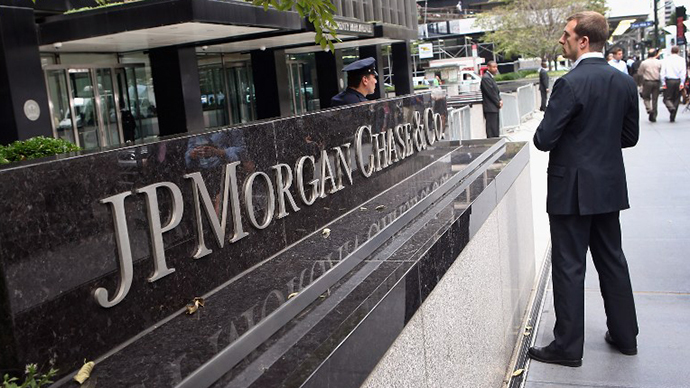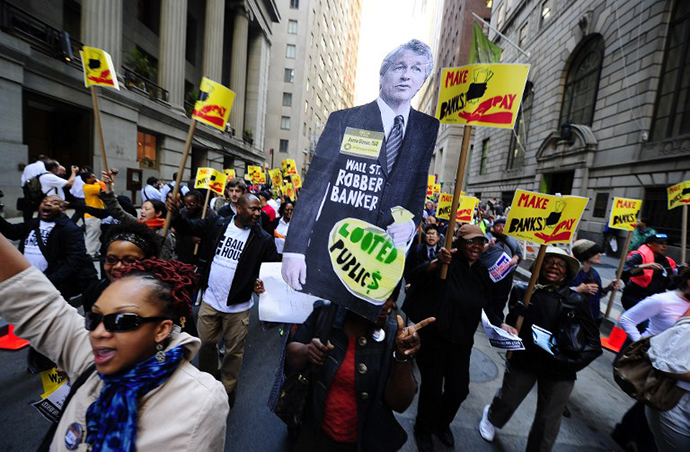US govt beating up bankers for its own mistakes

President Obama’s odd presidency takes another lurch towards the surreal as he actually manages to have some observers sympathizing with the banksters.
Without wishing to remove the unfolding drama of this column, readers of a sensitive disposition ought to be warned that sooner or later a vestige of sympathy will be expressed for bankers.
Yes, that seems utterly remarkable. I mean, take JP Morgan, whose renegade trader ‘The London Whale’ has provoked all manner of legal and regulatory backlash. Equally, JPM may be in line for a huge payout to mortgage bondholders on similar terms to those paid by Bank of America on similar claims.
So clearly the ‘no smoke without fire inde’ could be said to be trading vigorously in the general direction of JPM.
Once upon a time, JPM Chairman & CEO Jamie Dimon was rather
partial to that ‘hopey changey’ thing espoused by a 2004
Senate candidate from Chicago via Hawaii, who later metamorphosed
into a stunningly lackluster occupant of the White House. The
sheer ineffectiveness of the Obama Presidency provoked a
remarkable outburst by Dimon when he referred to the government
as leading “what I consider the constant attack on
business.”
Little more than a year later and Dimon may be regretting his words. Indeed JPM shareholders must surely regret this outburst as the “constant attack on business” seems to have involved a singular frontline revolving around - yes, you guessed it - JP Morgan.
This week a truly sensational $13 billion settlement
has been agreed with the US government concerning the US mortgage
market - which was out of control in the bubble period leading up
to the 2008 meltdown. However, the irony is that JPM itself
played a fairly modest role in the crisis and was broadly judged
to be a largely sensible actor in the mortgage marketplace.
However, two entities which were widely regarded as enormously culpable in the mortgage mania were Washington Mutual (‘WaMu’) and Bear Stearns. Each lent or packaged mortgages with frankly gay abandon and the consequences were ugly - both enterprises collapsed as the US housing market crashed.

In the depths of the crisis, the US Treasury essentially pleaded with JP Morgan to rescue both WaMu and Bear Stearns without permitting adequate time for Due Diligence. JPM was asked to help rescue the system - an action which the company had also undertaken, via their founder, in crashes such as the 1907 Wall Street meltdown which dissipated when J Pierpont Morgan himself led an investor group to calm the markets and infuse confidence back into a battered banking system.
Unfortunately, in the weird administration of Obamaland, what
actually happened was that instead of thanking JPM for taking a
risk, the government has ended up pursuing the bank with a unique
vigor. This week the US government fined JPM an unprecedented $13
billion for activity stemming not from the actions of the bank
itself, but rather the rogue enterprises the US Treasury itself
pressed JP Morgan to acquire at the height of the crisis.
Before you rush to say that bankers deserve everything coming to them, step back and consider the big picture: one clear effect of this cautionary tale will be that in a future financial crisis, managers will think long and hard before accepting the poisoned chalice of rescuing a venture which may ultimately come back to haunt them.
The US government has bizarrely placed the blame at JP Morgan’s door for the woes of government agencies Fannie Mae and Freddie Mac, whose cavalier approach to mortgage lending (spurred by government desires to feed affordable housing to all, oxymoronically, at any cost!) was a primary problem in the crisis. The concept that Fannie & Freddie were victims in the property bubble is truly worthy of Kafka. However, in the brave new world of President Obama, no opposition can be broached to his totalitarian state whether or not government is incompetent...and anybody who doubts the competence of government need only look at the fiasco of health exchange implementation, the flagship reform which could yet bankrupt the USA.
As to President Obama’s attitude towards commerce, well Dimon referred to constant attack. Presumably business surveillance is prevalent from the NSA, but at least so far the growth engines of the economy have not, yet, been subject to drone strikes...just rapine pillage from a spendthrift government desperate for cash to feed its death spiral addiction to debt.
Berating bankers may provide some amusement to onlookers
frustrated with this outmoded financial system sport, but two
wrongs rarely make a right, even in the rarefied world of
banking, or indeed in government.
The statements, views and opinions expressed in this column are solely those of the author and do not necessarily represent those of RT.
The statements, views and opinions expressed in this column are solely those of the author and do not necessarily represent those of RT.













